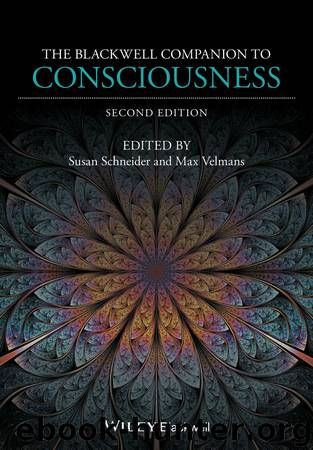The Blackwell Companion to Consciousness by Schneider Susan; Velmans Max; & Max Velmans

Author:Schneider, Susan; Velmans, Max; & Max Velmans
Language: eng
Format: epub
Publisher: John Wiley & Sons, Incorporated
Published: 2017-04-12T00:00:00+00:00
The Conceivability Argument
The arguments above specifically target particular materialist doctrines, and clearly contain elements that pertain directly to those doctrines. However, in their use of imagined possibilities – aliens and robots in the one case and inverted spectra and “China”‐heads in the other – they are analogous to a more general anti‐materialist argument that goes back at least to Descartes, and have a number of contemporary adherents (Kripke 1980; Chalmers 1996), and that is the “conceivability argument.”
The conceivability argument sounds much like the absent qualia argument, except that it isn’t restricted to functional duplicates. The simplest version involves what’s known as a “zombie.” A zombie is a creature that shares all its physical features with a normal human being, but nevertheless has no conscious mental states. As we might say, “it’s all dark inside.” There is nothing it’s like to be this creature. The question is, is such a creature conceivable?
Of course, “conceivable” is a term of art here, and it is both much weaker and much stronger in its demands than its colloquial counterpart. It is much weaker in the following sense. If someone were to wonder whether a zombie could really exist, one can imagine all sorts of reasons that would be brought to bear to justify a negative answer. Given what we know already about the dependence of much of our mental life on the brain, that some creature should have a brain like ours and not be conscious seems bizarre. It might also seem so unlikely as not to be taken seriously as a genuine possibility. But all this is consistent with zombies being conceivable in the technical sense at issue, for all that is required is that there be no internal contradiction, no conceptual incoherence in the very idea of a zombie. That the suggestion would seem utterly outlandish is not sufficient to render it inconceivable.
On the other hand, conceivability sets a higher standard than more normal imaginability in this sense: whether or not a scenario, such as the existence of a zombie, is internally consistent, or coherent, is not something that can be ascertained by casual inspection. A situation might seem imaginable or conceivable, and yet conceal within itself contradictory elements. It might take deep reflection and analysis to discover this internal inconsistency. An example of this phenomenon is any difficult theorem of mathematics. Before the proof, it seemed conceivable that the theorem might be false. Yet, once we have the proof, we see that it would be contradictory to assert that it’s false. In philosophy, many notions that people have thought quite sound – free will, God, independently existing physical objects, and many more – have been attacked as downright incoherent. So what’s really conceivable in the end can be a matter of serious controversy.
With this understanding of conceivability in mind, the anti‐materialist claims that zombies are indeed conceivable. There is no contradiction or incoherence lurking within a description of the zombie. Another way to put it is this. From a complete description
Download
This site does not store any files on its server. We only index and link to content provided by other sites. Please contact the content providers to delete copyright contents if any and email us, we'll remove relevant links or contents immediately.
| Administration & Medicine Economics | Allied Health Professions |
| Basic Sciences | Dentistry |
| History | Medical Informatics |
| Medicine | Nursing |
| Pharmacology | Psychology |
| Research | Veterinary Medicine |
The Art of Thinking Clearly by Rolf Dobelli(9916)
The 5 Love Languages: The Secret to Love That Lasts by Gary Chapman(9281)
Mindhunter: Inside the FBI's Elite Serial Crime Unit by John E. Douglas & Mark Olshaker(8702)
Becoming Supernatural by Dr. Joe Dispenza(7836)
The Road Less Traveled by M. Scott Peck(7279)
Nudge - Improving Decisions about Health, Wealth, and Happiness by Thaler Sunstein(7244)
Mastermind: How to Think Like Sherlock Holmes by Maria Konnikova(6937)
Enlightenment Now: The Case for Reason, Science, Humanism, and Progress by Steven Pinker(6875)
Win Bigly by Scott Adams(6828)
The Way of Zen by Alan W. Watts(6289)
Factfulness: Ten Reasons We're Wrong About the World – and Why Things Are Better Than You Think by Hans Rosling(4487)
The State of Affairs by Esther Perel(4485)
Gerald's Game by Stephen King(4376)
Man's Search for Meaning by Viktor Frankl(4275)
The Confidence Code by Katty Kay(4040)
Thinking in Bets by Annie Duke(3998)
The Worm at the Core by Sheldon Solomon(3325)
Hidden Persuasion: 33 psychological influence techniques in advertising by Marc Andrews & Matthijs van Leeuwen & Rick van Baaren(3292)
Enlightenment Now by Steven Pinker(3274)
